Plastids and types - Study guides, Class notes & Summaries
Looking for the best study guides, study notes and summaries about Plastids and types? On this page you'll find 95 study documents about Plastids and types.
Page 4 out of 95 results
Sort by
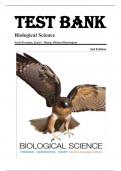
-
Test Bank for Biological Science Canadian Edition 2nd Edition by Scott Freeman, Michael Harrington, Joan C. Sharp
- Exam (elaborations) • 1121 pages • 2024
-
- $19.99
- + learn more
Test Bank for Biological Science, Canadian Edition 2nd Edition by Scott Freeman, Michael Harrington, Joan C. Sharp. Contents Chapter 1 Biology and the Tree of Life 1 1.1 The Cell Theory 2 Are All Organisms Made of Cells? 2 Where Do Cells Come From? 2 1.2 The Theory of Evolution by Natural Selection 4 What Is Evolution? 4 What Is Natural Selection? 4 1.3 The Tree of Life 5 Linnaean Taxonomy 6 BOX 1.1 Scientific Names and Terms 6 Using Molecules to Understand the Tree of Life 8 1.4 Doing Biology 1...
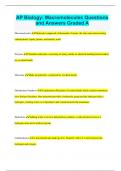
-
AP Biology: Macromolecules Questions and Answers Graded A
- Exam (elaborations) • 8 pages • 2023
- Available in package deal
-
- $9.99
- + learn more
AP Biology: Macromolecules Questions and Answers Graded A Macromolecules Molecules composed of thousands of atoms: the four main classes being carbohydrates, lipids, prteins, and nucleic acids Polymer Chainlike molecules, consisting of many similar or identical building blocks linked by covalent bonds. Monomer Make up polymers: connected by covalent bonds. Dehydration Synthesis (Condensation Reaction): Covalent bonds which connect monomers have distinct functions: One monomer provides a hydro...
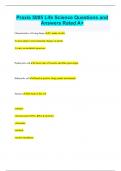
-
Praxis 5005 Life Science Questions and Answers Rated A+
- Exam (elaborations) • 15 pages • 2023
- Available in package deal
-
- $9.99
- + learn more
Praxis 5005 Life Science Questions and Answers Rated A+ Characteristics of living things 1) made of cells 2) must adapt to environmental changes or perish 3) carry on metabolic processes Prokaryotic cell consist only of bacteria and blue-green algae Eukaryotic cell found in protists, fungi, plants and animals Nucleus the brain of the cell contains: -chromosomes (DNA, RNA & proteins) -chromatin -nucleoli -nuclear membrane Ribosomes site of protein synthesis Endoplasmic reticulum vast system...
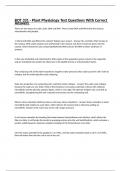
-
BOT 331 - Plant Physiology Test Questions With Correct Answers
- Exam (elaborations) • 5 pages • 2024
- Available in package deal
-
- $9.99
- + learn more
Correct Answers There are two types of nucleic acids: DNA and RNA. There is both DNA and RNA inside the nucleus, mitochondria and plastids. Is there both DNA and RNA in the cytosol? Explain your answer - Answer No, not both. DNA remains in the nucleus. RNA copies of genes are synthesized in the nucleus, but then moved out pores into the cytosol, where ribosomes (also containing RNA) bind RNA and use the RNA to direct synthesis of proteins. In the case of plastids and mitochondria, RNA c...
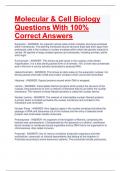
-
Molecular & Cell Biology Questions With 100% Correct Answers
- Exam (elaborations) • 27 pages • 2023
- Available in package deal
-
- $13.49
- + learn more
Molecular & Cell Biology Questions With 100% Correct Answers Eukaryote - ANSWER- An organism whose cells contain complex structures enclosed within membranes. The defining membrane bound structure thats sets them apart from prokaryotic cells is the nucleas or nuclear envelope within which the genetic material is carried. All species of large complex species are eukaryotes, including animals, plants and funghi. Euchromatin - ANSWER- This shows as pale areas in the nucleas under elect...

-
General Microbiology (100% correct)
- Exam (elaborations) • 4 pages • 2023
- Available in package deal
-
- $8.49
- + learn more
Classification of organisms correct answers Kingdom, Phylum, Class, Order, Family, Genus, Species Phylogenetic trees correct answers a branching diagram that represents a hypothesis about the evolutionary history of a group of organisms Types of microbes correct answers bacteria, archeae, fungi, molds, yeasts, protozoa, algae, viruses, multicellular animal parasites rRNA correct answers The RNA component of the ribosome, and is essential for protein synthesis in all living organisms. ...
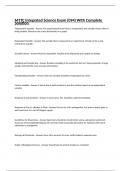
-
MTTC Integrated Science Exam (094) With Complete Solution
- Exam (elaborations) • 32 pages • 2024
- Available in package deal
-
- $13.99
- + learn more
Independent Variable - Answer The experimental factor that is manipulated; the variable whose effect is being studied. Placed on the x-axis (horizontal) on a graph. Dependent Variable - Answer The variable that is measured in an experiment. Placed on the y-axis (vertical) on a graph. Scientific theory - Answer Must be repeatable. Possible to be disproved and capable of change. Sampling and Sample Size - Answer Random sampling is the preferred, but isn't always possible. A large sample ...
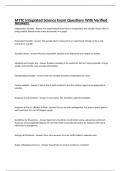
-
MTTC Integrated Science Exam Questions With Verified Answers
- Exam (elaborations) • 32 pages • 2024
- Available in package deal
-
- $12.99
- + learn more
Independent Variable - Answer The experimental factor that is manipulated; the variable whose effect is being studied. Placed on the x-axis (horizontal) on a graph. Dependent Variable - Answer The variable that is measured in an experiment. Placed on the y-axis (vertical) on a graph. Scientific theory - Answer Must be repeatable. Possible to be disproved and capable of change. Sampling and Sample Size - Answer Random sampling is the preferred, but isn't always possible. A large sample ...

-
AP Biology Multiple Choice Questions and Answers | 100% Pass
- Exam (elaborations) • 9 pages • 2024
- Available in package deal
-
- $9.99
- + learn more
AP Biology Multiple Choice Questions and Answers | 100% Pass Which is NOT a main feature of the cell theory? - Answer️️ -A.) Cells arise only by the division of existing cells. B.) The cell is the unit of function of all living things. C.) EACH CELL IS SURROUNDED BY A MEMBRANE IT'S C!!! What microscope magnifies objects hundreds of thousands of times? - Answer️️ - Electron Microscope Which is NOT a characteristic of biological membranes? - Answer️️ -a.) fluid properties b...
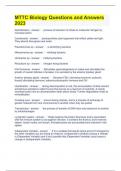
-
MTTC Biology Questions and Answers 2023
- Exam (elaborations) • 15 pages • 2023
-
Available in package deal
-
- $22.99
- + learn more
MTTC Biology Questions and Answers 2023 Denitrification process of reduction of nitrate to molecular nitrogen by microbial action Carotenoids photosynthetic plant pigments that reflect yellow red light. They absorb blue-green and violet Pseodomonas sp a denitrifying bacteria Nitrosomonas sp nitrifying bacteria nitrobacter sp nitrifying bacteria Rhizobium sp nitrogen fixing bacteria FSH hormone Stimulates spermatogenesis in males and stimulates th...

How much did you already spend on Stuvia? Imagine there are plenty more of you out there paying for study notes, but this time YOU are the seller. Ka-ching! Discover all about earning on Stuvia


